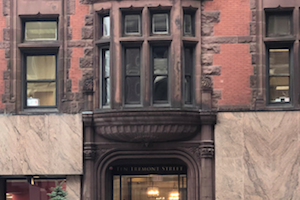For a Free Consultation
Massachusetts G.L.c. 90, § 24 (2)(a): Failure to Stop After Causing Property Damage
Massachusetts General Laws Chapter 90, section 24 governs a wide variety of motor vehicle related criminal offenses. Specifically, under section 24(2)(a) a person may be charged with leaving the scene of an accident causing property damage, also commonly referred to as a hit and run.
The relevant portion of the statute defines this offense as follows:
“whoever without stopping and making known his name, residence and the register number of his motor vehicle goes away after knowingly colliding with or otherwise causing injury to any other vehicle or property…”
A conviction of a charge under this section requires that the government prove several essential elements beyond a reasonable doubt:
- First, the government must prove that the defendant operated a motor vehicle;
- Second, they must prove that this operation occurred on a public way, or in a place where members of the public have access;
- Third, they must prove that by this operation the defendant did collide with or otherwise cause damage to another vehicle or property;
- Fourth they must prove that the defendant knew he had collided with or otherwise damaged said vehicle or property; and
- Finally, they must prove that after knowingly causing such damage the defendant failed to stop and provide name, address and vehicle registration number.
The law provides that the driver a vehicle has an affirmative duty to immediately stop at the scene and offer the specific information required, including name, address and vehicle registration. The operator must actually provide the required information, merely stopping and be willing to provide such information is insufficient. Further, the statute provides that this information must be given directly to the person whose property was damaged if reasonably possible.
Charges for leaving the scene of an accident may occur if you have even a minor collision with another vehicle parked in a parking lot and you leave without providing the required information to the owner of that vehicle. As such, while a minor parking lot fender bender may not seem significant, if you leave the scene following such an incident without providing your information you could be facing serious criminal charges.
PenaltiesA person convicted under this statute of leaving the scene of property damage may face a penalty of not less than 2 weeks in the house of correction, or a maximum of 2 years in the house of correction; a fine of not less than $20 nor more than $200, or both such fine and imprisonment.
Provided that the operator has adequate insurance coverage or is willing to make restitution for any damages, offenses under this section can often be resolved without the offender having to serve any time in jail, and may even be resolved in a way that would help preserve the criminal record of the defendant.
Defenses to Charges of Leaving the Scene of Property DamageExperienced criminal defense attorneys will be able to help you explore all options for defenses and favorable resolutions to the charge of leaving the scene of property damage. Where there may be witnesses or video surveillance of the incident defending against these charges can be difficult. However, in certain circumstances there may be opportunities to challenging the identity of the vehicle operator, as well as other possible defenses.
Related Offenses:- M.G.L. c. 90 § 24(1) – Operating Under the Influence
- M.G.L. c. 90 § 24G – Vehicular Homicide
- M.G.L. c. 90 § 24(2) (a) – Operating to Endanger
- M.G.L. c. 90 § 24(2)(a ½)(1) – Leaving the Scene of an Accident – Personal Injury
If you or someone you know has been charged with motor vehicle related crime in Massachusetts, contact the Law Offices of Stephen Neyman, P.C. Attorney Neyman has multiple decades of experience defending those who have been accused of such offenses in Boston and all throughout Massachusetts. He is an aggressive and smart attorney who is relentless in protecting the rights of his clients. You can reach Attorney Neyman by calling 617-263-6800 or by sending him an email at steve@neymanlaw.com. He offers free and confidential initial consultations, which he will schedule at your convenience.
 Law Offices of Stephen Neyman Criminal Lawyers Home
Law Offices of Stephen Neyman Criminal Lawyers Home










